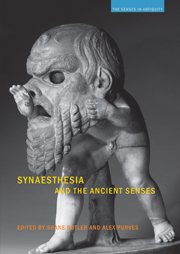Book contents
- Frontmatter
- Contents
- Contributors
- Introduction: synaesthesia and the ancient senses
- 1 Why are there nine Muses?
- 2 Haptic Herodotus
- 3 The understanding ear: synaesthesia, paraesthesia and talking animals
- 4 Aristophanes, Cratinus and the smell of comedy
- 5 “Looking mustard”: Greek popular epistemology and the meaning of δριμύς
- 6 Plato, beauty and “philosophical synaesthesia”
- 7 Manilius' cosmos of the senses
- 8 Reading death and the senses in Lucan and Lucretius
- 9 Colour as synaesthetic experience in antiquity
- 10 Blinded by th light: oratorical clarity and poetic obscurity in Quintilian
- 11 The sense of a poem: Ovids Banquet of Sence (1595)
- 12 Saussure's anaphonie: sounds asunder
- 13 Beyond Narcissus
- Bibliography
- Index
7 - Manilius' cosmos of the senses
- Frontmatter
- Contents
- Contributors
- Introduction: synaesthesia and the ancient senses
- 1 Why are there nine Muses?
- 2 Haptic Herodotus
- 3 The understanding ear: synaesthesia, paraesthesia and talking animals
- 4 Aristophanes, Cratinus and the smell of comedy
- 5 “Looking mustard”: Greek popular epistemology and the meaning of δριμύς
- 6 Plato, beauty and “philosophical synaesthesia”
- 7 Manilius' cosmos of the senses
- 8 Reading death and the senses in Lucan and Lucretius
- 9 Colour as synaesthetic experience in antiquity
- 10 Blinded by th light: oratorical clarity and poetic obscurity in Quintilian
- 11 The sense of a poem: Ovids Banquet of Sence (1595)
- 12 Saussure's anaphonie: sounds asunder
- 13 Beyond Narcissus
- Bibliography
- Index
Summary
The Astronomica of Marcus Manilius, a Latin didactic poem in five books composed in the early second decade CE, is our earliest extant comprehensive treatment of horoscopic astrology, containing highly technical discussions of such matters as the characteristics, divisions and influences of the signs of the zodiac, the computation of the ascendant and the significance of extrazodiacal constellations. However, despite its (pseudo-)scientific subject matter, the work is far more than a compendium of “sums in verse” (to use the derisive words of Manilius' famous editor A. E. Housman): it is what is sometimes referred to as a Weltgedicht, a poem that projects a larger vision of the nature of the universe and man's place in it. The cosmos that Manilius' text presents is indeed a kosmos, a realm of order and beauty that is governed by fate, the nexus of cause and effect that the astrologer attempts to uncover through observation and interpretation of the heavenly bodies. Painting an image of the universe as a living and divine organism in which all parts are interconnected, the Astronomica shows great affinities to Stoic physics, which views the world as a corporeal continuum informed by the sympatheia (“feeling together”) of its constituents. It is this underlying cosmology that enables the poet's claim that the stars are capable of causing events on earth and that humans are at all times affected by and, to some extent, able to affect their cosmic surroundings. As I shall attempt to show in what follows, this intimate interaction with the universe is one that engages human beings through all their senses.
- Type
- Chapter
- Information
- Synaesthesia and the Ancient Senses , pp. 103 - 114Publisher: Acumen PublishingPrint publication year: 2013



